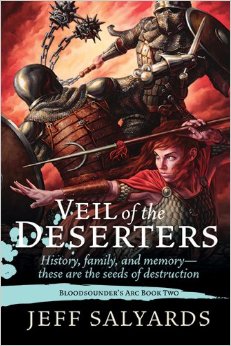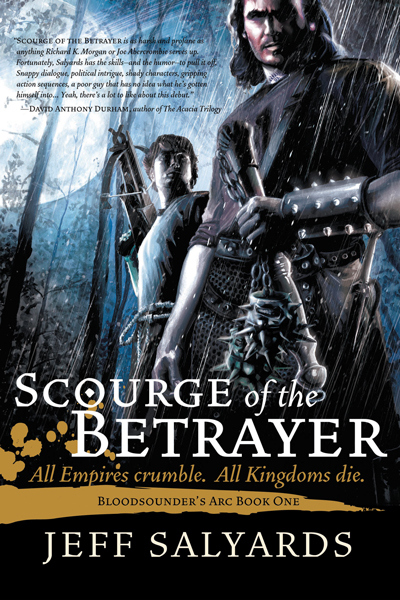In a border kingdom of the Syldoon Empire, a long-range military unit has gotten itself too tangled with local politics for its own good. Its commander, Captain Killcoin, having lost one of the few people who can keep him all together with his dangerous mind-warping weapon Bloodsounder, is in a heap of trouble with higher ups in the Empire. Trouble enough that one of the most dangerous people in the Empire has been fetched to bring him home — his sister. The completion of Killcoin’s task and the journey home to the capital is not going to be a straight road by any means.
And chronicling, witnessing, watching this all, an unlikely protagonist — a scribe, with little military skill, who is only slowly shedding his callowness. He’s hired by the Syldoon for purposes only now becoming clear. Purposes that could shake an Empire. Arkamondos is in way, way over his head.

Veil of the Deserters is the second in Jeff Salyards’ Bloodsounder’s Arc series and is sequel to his debut novel Scourge of the Betrayer.
This second novel picks up not long after the events of Scourge of the Betrayer, leaving Arki and the Syldoonians reacting to the aftermath of the mess of things made at the end of that previous novel. Readers unfamiliar or having spent a while since reading the first novel are not coddled here; there is an economy of bringing readers up to speed on characters or even the local situation on the ground. The author pairs this with getting quickly to brutally sharp action and conflict, putting our protagonists in a jam and letting conflict do the heavy lifting of character development. And, of course, the brutal action and conflict work as set-pieces in and of themselves This is something the author is good at, and he continues to play that theme throughout this novel as well as its predecessor. We get a variety of sequences as our protagonist and the Syldoons face different sorts of battles and enemies.
One could characterize the Arki’s, the protagonist, character arc as being punctuated by these battle sequences, growing and adapting and shedding his naivete with each one. The Arki at the beginning of this novel, and certainly the Arki at its conclusion, is far different than the Arki hired by the Syldoon at the beginning of Scourge of the Betrayer. Other characters have somewhat less pronounced character arcs, save for Captain Braylor Killcoin himself, about whom we learn a great deal through the course of this novel, especially his interactions with Soffjan, the mind-witch Memoridon and Killcoin’s sister. She and her disciple Skeelana, and the depth of the universe they bring by their background, are wonderful additions to the cast. Their presence puts Captain Killcoin, his motivations, his desires, and his background, into greater relief.

And that is one of the strengths of this novel that the first novel firmly lacked. Worldbuilding. First off, the first volume lacked a map; especially with its strange end-of-the-world geography (the Veil in the title of this novel), figuring out who and where places were was a real challenge. This volume, however, corrects that problem, providing a map that helped me put the events and travels of the first novel in context and orient myself for the journeys in the second novel as well. We get to see much more of the world, its people and its cultures, in Veil of the Deserters.
Deeper than just a map, though, a lot of the de-saturated and under-explored worldbuilding that I lamented while reading Scourge of the Betrayer are corrected here. We learn far more about the Gods, their abandonment of the world, and how they connect to Bloodsounder itself. We also learn much more about the Syldoon Empire even before we get to journey there, seeing Sunwrack, its capital, for ourselves. The Syldoon Empire and its political setup remind me strongly of a mix of Barracks-era Roman Empire, a very strong dose of Mary Gentle’s Visigoths, and other inspirations as well. The machinations of the Empire, seen as a distant cloud on the horizon in the first volume, come to a full fury and fulmination in this volume as we journey to its heart.
And the magic in this universe, as seen in the memory magic of the Memoridons (and Bloodsounder itself) is very much alien, dark, and mysterious. It’s definitely much more sword and sorcery type magic than the codified magic more often seen in epic fantasy. This continues the Moorcockian feel (especially with its deserted Gods) that was hinted at all too thinly in the first volume. Here, we get much more of the background of the world and its theology and mythology.
In the end, though,Veil of the Deserters, for all of its action beats is firmly about these characters and what they go through, especially Arki. The appearance of Soffjan on the scene turns what had been a fish-out-of-water in a military unit story into a story revolving around old history, family, broken promises and conflicting loyalties. While the novel is at its strongest when throwing the characters into physical conflict with their enemies, it is the social conflicts, the intrigue and the cross purposes that wonderfully drive the plot and drive the characters toward and against each other. While the novel doesn’t stand on its own, and does suffer from the usual middle-novel problems, this novel lays down clear lines for a subsequent volume that I, for one, am very interested in reading. Now.









3 Responses